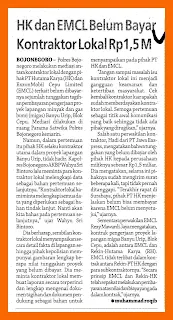Revision of Law No. 22/2001 on Oil and Gas (Oil) that has been rolling in Parliament is targeted to be completed this year. The outline of the beleid revision emphasizes that strategic sector management should be shaded by specialized agencies outside the government.
The Oil and Gas Draft (RUU Migas) should have entered the latest revision. After that, submitted to the Legislature so that the middle of the year or the end of this year has been ratified, said members of Commission VII DPR.
So far, the management of the oil and gas sector is in the hands of the Special Unit for Upstream Oil and Gas Activities (SKK Migas) which is the representative of the government. However, by referring to the decision of the Constitutional Court (MK) which previously canceled the Oil and Gas Law, the provision must be changed. In this case, institutional SKK Migas should be converted into a special business entity (BUK) oil and gas outside the government.
He said that BUK will receive oil and gas concessions from the government to create cooperative contracts (KKS) with investors or contractors of cooperation contracts (KKKS). The direction of BUK Migas institution is focused as a business entity whose status is under the president. BUK Migas is like a company, but under the president directly. Not Again Government institutions such as SKK Migas.
According to him, if the old concept is maintained, the sovereignty of the state will be threatened. That's because the government position represented by SKK Migas parallel to the KKKS when contracting. Although all factions in Commission VII of the House of Representatives (DPR RI) almost agreed on the oil and gas BUK, it urged that the new institution not only include SKK Migas, but also PT Pertamina.
Separately, the Ministry of Energy and Mineral Resources (ESDM) inaugurated the Energy Efficient Furnace Testing Laboratory (TSHE), the result of cooperation with the World Bank in the Clean Stove Initiative program with a grant of US $ 300 thousand.
The inauguration of the TSHE Test Laboratory could be a solution for the community in encouraging the creation of a healthier and energy-efficient stove so that it is expected to be able to develop a healthy and energy-efficient stove market, "said Bioenergy Director of the Ministry of Energy and Mineral Resources Sudjoko Harsono Adi.
IN INDONESIAN
Revisi UU Minyak dan Gas Bumi Hampir Rampung
Revisi Undang-Undang Nomor 22/2001 tentang Minyak dan Gas Bumi (Migas) yang sudah Iama bergulir di parlemen ditargetkan rampung tahun ini. Garis besar revisi beleid itu menitikberatkan pengelolaan sektor strategis harus dinaungi lembaga khusus di luar pemerintah.
Semestinya (RUU Migas) sudah masuk revisi terakhir. Setelah itu, diserahkan ke Badan Legislatif sehingga tengah tahun atau akhir tahun ini sudah disahkan, kata anggota Komisi VII DPR.
Selama ini, pengelolaan sektor migas ada di tangan Satuan Kerja Khusus Pelaksana Kegiatan Hulu Minyak dan Gas Bumi (SKK Migas) yang merupakan wakil pemerintah. Namun, dengan mengacu amar putusan Mahkamah Konstitusi (MK) yang sebelumnya membatalkan Undang-Undang Migas, ketentuan tersebut harus diubah. Dalam hal ini, kelembagaan SKK Migas harus diubah menjadi Badan Usaha Khusus (BUK) migas yang berada di Iuar naungan pemerintah.
Ia mengatakan nantinya BUK menerima konsesi migas dari pemerintah untuk membuat kontrak kerja sama (KKS) dengan investor atau kontraktor kontrak kerja sama (KKKS). Arah dari kelembagaan BUK migas berfokus sebagai entitas bisnis yang statusnya ada di bawah presiden. BUK migas ini seperti perusahaan, tapi di bawah presiden Iangsung. Bukan Iagi Iembaga pemerintah seperti SKK Migas.
Menurut dia, jika konsep lama dipertahankan, kedaulatan negara akan terancam. Itu disebabkan posisi pemerintah yang diwakilkan SKK Migas sejajar dengan KKKS saat berkontrak. Meskipun semua fraksi di Komisi VII DPR RI hampir bersepakat soal BUK migas, pihaknya mendesak agar lembaga baru itu tidak hanya mencakup SKK Migas, tetapi juga PT Pertamina.
Secara terpisah, Kementerian Energi dan Sumber Daya Mineral (ESDM) meresmikan Laboratorium Uji Tungku Sehat Hemat Energi (TSHE), hasil kerja sama dengan World Bank dalam program Clean Stove Initiative dengan dana hihah sebesar US$300 ribu.
Peresmian Laboratorium Uji TSHE ini bisa jadi solusi bagi masyarakat dalam mendorong terciptanya tungku Iebih sehat dan hemat energi sehingga diharapkan mampu mengembangkan pasar tungku sehat dan hemat energi secara berkelanjutan, kata Direktur Bioenergi Kementerian ESDM Sudjoko Harsono Adi.
Media Indonesia, Page-17, Thursday, April, 27, 2017










